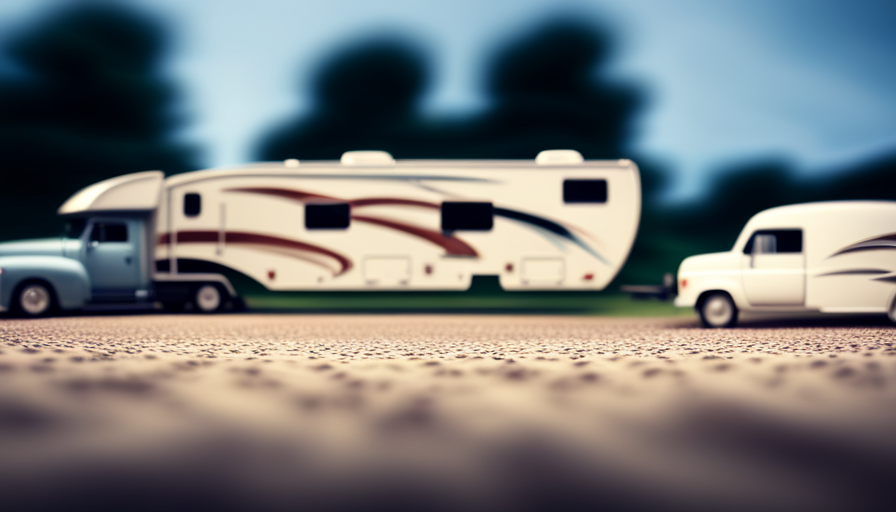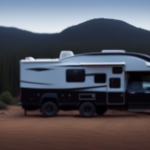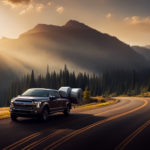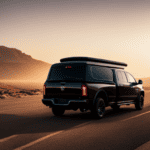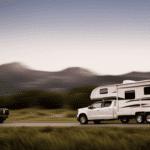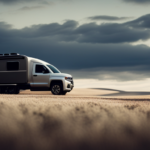Were you aware that a 30-foot camping trailer typically weighs approximately 8,000 pounds? This is akin to the combined weight of four compact cars! When preparing for a camping adventure or contemplating buying a camping trailer, selecting an appropriately sized truck for secure towing is essential.
In this article, we will provide you with all the information you need to determine the perfect truck size for your 30-foot camper.
First, we will guide you through the process of determining the weight of your camper and calculating the towing capacity of different trucks. We will also discuss the importance of considering the truck’s engine power, stability, and suspension to ensure a smooth and safe towing experience. Additionally, we will explore other factors such as bed length, fuel efficiency, and cost to help you make an informed decision.
Before making any final choices, it’s crucial to test drive different trucks and seek expert advice. We will also emphasize the importance of considering your future needs and ensuring proper maintenance and safety precautions.
By the end of this article, you’ll have all the knowledge you need to confidently choose the perfect truck to pull your 30-foot camper and embark on your next adventure.
Key Takeaways
- Choosing the right size truck is crucial for safe towing of a 30-foot camper.
- Factors to consider include bed length, fuel efficiency, cost, engine power, stability, suspension, and towing capacity.
- Proper weight distribution, stability, and maneuverability are important for accident prevention when towing a camper.
- Additional towing features such as towing mirrors, weight distribution hitches, sway control systems, and trailer brake controllers enhance the towing experience.
Determine the Weight of the Camper
You’ll need to determine the weight of the camper to find the right size truck to pull it.
To do this, you should consider the weight distribution of the camper. This includes the weight of the trailer itself, as well as any additional weight from supplies or equipment inside. It’s important to have an accurate estimate of the weight, as an overloaded truck can be dangerous and cause handling issues.
In addition to the weight, you should also take into account the height and width of the camper. This is important because you want to make sure that the truck you choose can safely accommodate the size of the camper. If the camper is too tall or wide for the truck, it can lead to clearance problems and potential damage to both the truck and the camper.
Once you have determined the weight and dimensions of the camper, you can then calculate the towing capacity of the truck. This will help you determine the size of the truck needed to safely tow the camper.
By following these steps, you can ensure that you find the right size truck to pull your 30ft camper without any issues.
Calculate the Towing Capacity of the Truck
To accurately gauge the truck’s ability to tow, it’s crucial to calculate its towing capacity first.
Did you know that some heavy-duty trucks can tow over 15,000 pounds?
Calculating the towing capacity of a truck involves taking into consideration various factors, such as the vehicle’s gross vehicle weight rating (GVWR), engine power, transmission, and axle ratio. However, the most important factor in determining towing capacity is the truck’s frame and suspension. These components need to be strong enough to handle the weight and stress of towing a 30-foot camper.
To calculate the towing capacity, start by determining the weight of the camper. This can be done by using a scale or referring to the manufacturer’s specifications. Once you have the weight, you can then compare it to the truck’s towing capacity. Keep in mind that the towing capacity may vary depending on the specific model and trim level of the truck.
After calculating the towing capacity, the next step is to consider the truck’s engine power. A more powerful engine will be able to handle heavier loads more efficiently. Additionally, it’s important to consider the truck’s transmission, as a transmission with more gears can provide better towing performance.
Calculating the towing capacity of a truck is essential when determining its ability to tow a 30-foot camper. Once the towing capacity is determined, the next step is to consider the truck’s engine power and transmission capabilities. By taking all these factors into account, you can ensure a safe and efficient towing experience.
Consider the Truck’s Engine Power
With a powerful engine, the truck becomes a force to be reckoned with when it comes to towing heavy loads. The engine power directly affects the truck’s towing capacity, making it an essential factor to consider when choosing the right truck for pulling a 30ft camper.
Here are some key points to assess the engine performance and compare towing capacities:
-
Horsepower: A higher horsepower engine typically translates to better towing capability. More horsepower means the truck can generate more force to pull the camper efficiently.
-
Torque: Torque is equally important as it measures the rotational force the engine can produce. Higher torque allows the truck to handle uphill climbs and maintain speed on the highway with ease.
-
Transmission: Opt for a truck with a transmission designed for towing, such as a heavy-duty automatic transmission or a manual transmission with a low gear range. This ensures smooth power delivery and better control over the load.
-
Cooling system: Towing puts a strain on the engine, so a robust cooling system is vital to prevent overheating and ensure optimal performance.
Assessing the truck’s stability and suspension is the next crucial step in determining the right truck for towing a 30ft camper.
Assess the Truck’s Stability and Suspension
When considering the right truck for towing a 30ft camper, make sure to evaluate how stable and well-suspended the vehicle is. Assessing truck stability is crucial to ensure a smooth and safe towing experience. A stable truck will be less prone to swaying or fishtailing, providing better control on the road.
Look for trucks that have a sturdy frame and a low center of gravity, as these factors contribute to stability.
In addition to stability, it’s important to consider the truck’s suspension. A well-designed suspension system can help absorb the vibrations and bumps encountered while towing, reducing the strain on both the truck and the camper. Upgrading the suspension can also improve the overall towing experience, especially if you plan on traveling on rough terrain or uneven roads.
When assessing the truck’s suspension, consider factors such as the type of suspension (leaf springs or coil springs), the load capacity, and any available suspension upgrades. Some trucks even offer special towing packages that include upgraded suspension components specifically designed for towing purposes.
By carefully evaluating truck stability and suspension, you can ensure a safer and more comfortable towing experience.
Now, let’s move on to the next section and explore how to choose the right truck size and bed length for your 30ft camper.
Choose the Right Truck Size and Bed Length
When choosing the right truck size and bed length for towing a 30ft camper, there are a few key points to consider. First, it’s important to take into account the size and weight of the camper, as well as its hitch configuration. This will help determine the appropriate truck size and towing capacity needed.
Additionally, ensuring that the truck has a suitable bed length for towing the camper is crucial for stability and maneuverability on the road. By considering these factors, one can make an informed decision and ensure a safe and enjoyable towing experience.
Consider the size of the camper and its hitch configuration
Considering the size of the camper and its hitch configuration, it’s essential to find a truck that’s capable of handling the weight and towing capacity. The weight of the camper plays a significant role in determining the size of the truck needed for towing. It’s crucial to know the weight of the camper, including any additional equipment and supplies.
This information will help determine the towing capacity required for a truck. Additionally, the hitch type is another important factor to consider. Different campers may have different hitch configurations, such as a bumper hitch or a gooseneck hitch. It’s important to ensure that the truck’s hitch is compatible with the camper’s hitch type.
Lastly, to ensure a smooth and safe towing experience, it’s crucial to have a truck with a suitable bed length for towing the camper, allowing for proper weight distribution. This ensures stability on the road and prevents any potential accidents.
Ensure that the truck has a suitable bed length for towing the camper
To achieve stability on the road and prevent potential accidents, it’s crucial to ensure the truck’s bed length is suitable for towing the camper, allowing for proper weight distribution. When choosing a truck for towing a 30ft camper, it’s important to consider the bed length.
The bed length determines the distance between the hitch and the rear axle, which affects the overall stability of the towing setup. A longer bed length provides better weight distribution, reducing the chances of swaying or fishtailing while driving. Additionally, a longer bed length allows for better maneuverability and easier backing up.
It’s also important to note that proper maintenance and safety precautions should be followed when towing a camper. Regularly checking the truck’s tire pressure, brakes, and suspension system is essential for a safe towing experience.
By choosing a truck with the right bed length and practicing proper maintenance, you can ensure a smooth and secure towing journey.
Now, let’s check for additional towing features to further enhance the towing experience.
Check for Additional Towing Features
In order to ensure a safe and efficient towing experience for a 30ft camper, it’s advisable to examine any additional towing features that may be necessary.
One important feature to consider is the availability of additional towing accessories. These can include items such as towing mirrors, weight distribution hitches, and sway control systems. Towing mirrors are essential to provide better visibility while maneuvering the camper on the road.
Weight distribution hitches help distribute the weight evenly between the truck and the camper, reducing strain on the truck’s suspension. Sway control systems help minimize any swaying or wobbling of the camper, ensuring a stable and controlled towing experience.
Another crucial feature to look for is a trailer brake controller. This device allows the driver to control the trailer’s brakes independently, providing additional stopping power and improved safety. It’s especially important when towing a larger and heavier camper like a 30ft one.
Considering these additional towing features will greatly enhance your towing experience and contribute to a safer journey.
Furthermore, it’s important to consider fuel efficiency and cost when selecting a truck to pull a 30ft camper. By choosing a truck with good fuel efficiency and considering the associated costs, you can ensure that your camping trips remain enjoyable without breaking the bank.
Consider Fuel Efficiency and Cost
Fuel efficiency and cost are key factors to keep in mind when choosing a truck to tow your 30ft camper, ensuring a wallet-friendly and environmentally conscious camping adventure. When it comes to fuel efficiency, it’s important to consider the type of engine and the overall weight of the truck. Opting for a truck with a diesel engine can often result in better fuel economy compared to a gasoline engine. Additionally, trucks with lighter bodies and aerodynamic designs tend to be more fuel efficient.
Another important consideration is the towing capacity of the truck. It’s essential to choose a truck that can comfortably handle the weight of your 30ft camper. Look for a truck with a towing capacity that exceeds the weight of your camper, allowing for safer and more efficient towing.
While fuel efficiency and towing capacity are important factors to consider, it’s also crucial to keep cost in mind. Not only should you consider the upfront cost of the truck, but also the long-term costs such as fuel expenses and maintenance. It’s worth comparing different truck models and their fuel efficiency ratings to determine the most cost-effective option for your camping needs.
When choosing a truck to tow your 30ft camper, it’s essential to strike a balance between fuel efficiency and towing capacity. By considering these factors, you can ensure a smooth and economical camping experience.
In the next section, we will discuss the importance of test driving and seeking expert advice to make an informed decision about the right truck for your needs.
Test Drive and Seek Expert Advice
Before you take the leap and decide on the perfect truck, picture yourself behind the wheel, feeling the power of the engine as you glide smoothly down the road, knowing that you made the right choice after seeking expert advice and taking a test drive.
When it comes to choosing the right truck to pull your 30ft camper, there are a few key considerations to keep in mind. One of the most important steps in the decision-making process is to take the time to test drive different trucks. This allows you to get a feel for how each truck handles on the road and how it performs when towing a camper. It’s important to pay attention to the truck’s acceleration, braking, and overall stability while towing.
In addition to test driving, seeking expert advice is crucial. Experts in the field can provide valuable insights and recommendations based on their experience and knowledge. They can help you understand the specifications and capabilities of different trucks, ensuring that you make an informed decision. Expert advice can also help you avoid potential pitfalls and ensure that you choose a truck that is well-suited for your needs.
Consider the following benefits of test driving and the importance of expert advice:
- Test driving allows you to experience the truck’s performance firsthand.
- Expert advice provides valuable insights and recommendations.
- Test driving and seeking expert advice help you make an informed decision.
- Expert advice can help you avoid potential pitfalls.
- Test driving and expert advice ensure that you choose a truck that meets your needs.
By taking the time to test drive different trucks and seeking expert advice, you can confidently choose the right truck to pull your 30ft camper. With the knowledge and experience gained from these steps, you can consider your future needs and make a decision that will truly meet your requirements.
Consider Your Future Needs
Consider your future needs.
Imagine yourself envisioning the future and contemplating your evolving requirements for a vehicle that can effortlessly transport your beloved 30ft camper. When considering what size truck to pull a 30ft camper, it’s essential to think about your future planning and long-term needs.
While your current camper may be 30ft in length, you might want to upgrade to a larger one in the future. Therefore, it’s wise to choose a truck that can handle not only your current camper but also potential future upgrades.
Think about other factors as well, such as the number of people you plan to travel with and the amount of gear you intend to bring along. As your family grows or your camping style changes, you may require additional space and capacity. It’s important to choose a truck that can accommodate these evolving needs without compromising on performance or safety.
By considering your future needs, you can make a more informed decision about the size of the truck that is best suited for your 30ft camper. This foresight will ensure that you have a vehicle that can meet your requirements for years to come.
As you plan for the future, it’s vital to also think about the necessary steps to ensure proper maintenance and safety precautions for your truck and camper.
Ensure Proper Maintenance and Safety Precautions
To ensure a smooth and worry-free journey with your beloved 30ft camper, it’s crucial that we prioritize regular maintenance and take necessary safety precautions.
Proper maintenance is essential for the longevity and performance of both the truck and the camper. Regularly checking and servicing the engine, brakes, tires, and suspension will not only prevent unexpected breakdowns but also ensure a safe and efficient towing experience. It is recommended to follow the manufacturer’s guidelines for maintenance intervals and procedures.
In addition to proper maintenance, taking safety precautions is equally important. Before hitting the road, it’s crucial to inspect the hitch, safety chains, and electrical connections to ensure they’re secure and functioning correctly. We should also make sure to distribute the weight properly within the camper and secure all loose items to prevent shifting during travel. It’s advisable to invest in a high-quality weight distribution hitch and sway control system to enhance stability and control while towing.
Furthermore, maintaining proper tire pressure and regularly inspecting the tires for any signs of wear or damage is vital for safe towing. We should also be mindful of the weight limits of both the truck and the camper and avoid exceeding them. Lastly, always keep a safe distance from other vehicles and drive at a moderate speed to ensure stability and control.
By prioritizing proper maintenance and taking necessary safety precautions, we can enjoy a worry-free journey with our 30ft camper and create lasting memories with our loved ones.
Frequently Asked Questions
Can I use a smaller truck to pull a 30ft camper if it’s within the towing capacity?
Yes, a smaller truck can be used to pull a 30ft camper as long as it’s within the towing capacity. However, it’s important to consider potential fuel efficiency and the impact on the vehicle’s lifespan. While a smaller truck may provide better fuel efficiency, it may also experience more wear and tear due to the increased strain of towing a larger camper. It’s always a good idea to consult the manufacturer’s guidelines and consider the specific needs of your camper before making a decision.
What are the potential risks of using a truck with a lower towing capacity than the weight of the camper?
When it comes to towing a camper, it’s crucial to match the truck’s towing capacity with the weight of the camper. Ignoring this can lead to potential risks.
According to a study by the National Highway Traffic Safety Administration, the risk of accidents increases when towing capacity is exceeded. This includes difficulty controlling the vehicle, decreased braking ability, and potential damage to the truck’s transmission and engine.
Therefore, it’s important to prioritize safety and choose a truck with the appropriate towing capacity.
Are there any specific engine types or power requirements for pulling a 30ft camper?
When considering engine types and power requirements for pulling a 30ft camper, it’s important to prioritize towing capacity and torque.
A truck equipped with a robust engine, such as a V8 or turbocharged V6, will provide the necessary power to handle the weight and size of the camper.
Additionally, a strong transmission and a reliable cooling system are essential to maintain optimal performance while towing.
How do I determine if a truck’s stability and suspension are suitable for towing a 30ft camper?
Determining truck stability and ensuring a suitable suspension are crucial when towing a 30ft camper.
The stability of the truck is essential to maintain control and prevent swaying while on the road. A well-designed suspension system helps absorb the weight and movement of the camper, providing a smoother and safer towing experience.
Properly assessing these factors ensures a comfortable and secure journey, giving you peace of mind while towing your 30ft camper.
Are there any additional factors to consider when choosing the right truck size and bed length for towing a 30ft camper?
When selecting the right truck and bed length for towing a 30ft camper, there are some additional factors to consider.
Apart from the obvious size requirements, weight distribution plays a crucial role in ensuring stability and control while on the road. By properly distributing the weight of the camper and understanding the truck’s towing capacity, you can ensure a safe and smooth towing experience.
These additional considerations are essential for a successful journey.
What Size Truck Is Needed to Pull a 30ft Camper?
When it comes to pulling a 30ft camper, the truck size for pulling a camper should be chosen carefully. Ideally, a heavy-duty truck with a sufficient towing capacity would be required to handle the weight and size of the camper. It is essential to consult the camper’s manufacturer or a professional to determine the specific truck size needed for optimal towing performance and safety.
Conclusion
In conclusion, when determining the right size truck to pull a 30ft camper, it’s important to consider various factors. These factors include the weight of the camper, the towing capacity of the truck, the engine power, stability and suspension, truck size and bed length, fuel efficiency and cost. It’s also important to seek expert advice and consider future needs.
One interesting statistic to note is that, according to a study, overloading a truck beyond its towing capacity can increase the risk of accidents by 50%. This highlights the importance of choosing the right truck size for safe and reliable towing.

